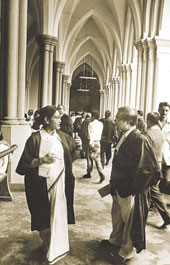 |
| Long overdue : Introduction of evening courts could decrease the backlog of cases |
Evening courts have for long been considered a step that would ease the burden of the judiciary. There are 2.5 crore cases pending in the country’s courts, and it is being argued that a second shift in subordinate courts will effectively tackle the backlog.
Gujarat has shown the way, but West Bengal is seemingly caught in a bind. The government is keen on evening courts, but a section of lawyers is opposed to it.
Gujarat became the first state to introduce evening courts — which function between 6 pm and 8 pm — in November, 2006. And, according to the figures provided by the state, it has been a success. Around 70,000 cases have been disposed off since its introduction.
“The poor and working class people could not attend court during regular working hours. We, in consultation with the high court, thought that an introduction of evening courts would enable them to attend the court after their working hours,” says Ashok Bhatt, Gujarat’s minister of law. “The people, the lawyers and the bar associations have welcomed the concept and the response has been positive,” Bhatt says.
Small wonder then that in April this year, at the annual conference of chief ministers and chief justices in New Delhi, Prime Minister Manmohan Singh and the Chief Justice of the Supreme Court of India, K.G. Balakrishnan, reiterated that courts should work in shifts to help clear the mountain of pending cases.
There are more than 30 lakh cases pending in various courts in Gujarat. The evening courts, according to Bhatt, can dispose off around 25 per cent of these cases. Some of the cases that are taken up in these courts include civil cases up to a claim of Rs 1 lakh, cases under the Motor Vehicle Act, criminal cases where punishment can go up to three years’ imprisonment, labour cases, criminal revision applications and others.
The Gujarat formula, however, is still to be followed by most other states. Under Article 235 of the Constitution, administration of justice is a state subject. It is the state government in consultation with its concerned high court that decides all matters concerning operations and setting up of courts.
While Bengal is still to take a final decision, Tamil Nadu is following in the footsteps of Gujarat. The southern state will issue a notification on the introduction of evening courts this month. “The courts, numbering around 60, will function on a pilot basis in the municipal areas,” says S. Malathi, home secretary, Tamil Nadu. “Cases covered will be mostly petty crimes such as traffic violations and fines of various kinds. These cases would normally take up around one-and-a-half to two hours in normal courts. With the introduction of evening courts, this time can be devoted to other more important cases,” she says.
According to Malathi, there are around 3,69,000 cases that have been identified in the state and which can be taken up by the municipal courts.
In West Bengal, there are more than one million cases pending in the subordinate courts, and as in other states, many of them are petty cases that can be disposed off within a short period of time. At the annual conference of chief ministers and chief justices in New Delhi in April this year, chief minister Buddhadeb Bhattacharya had suggested that the infrastructure in the state could be “profitably utilised to increase output within a short time”, although he acknowledged that the shift system had “problems concerning the security of all witnesses, and availability of court officials and the convenience of learned advocates”.
But the state government has hit a dead-end. The state bar council has objected to the introduction of the shift system, especially the evening courts. “We lawyers have to prepare for cases and we need time to argue the day after. If we are in the courts till late in the evening, how can we argue our cases well?” asks Geetanath Ganguly, executive chairman of the Legal Aid Services, West Bengal.
Infrastructure also poses a huge problem. “If evening courts are introduced, clients and their lawyers will face the problem of transport and even the police will have problems in producing the undertrials in the evening,” says Sanatan Mukherjee, chairman of the bar council. But Mukherjee has an alternative suggestion. “Instead of having evening shifts, the government can increase the working hours of the court by an hour and ask the courts to handle petty cases that have been dragging on for a long time,” he says.
The bar council believes that the state should first take care of the shortage of around 60 additional district session judges in various courts across the state and also complete the setting up of its quota of fast track courts so that the backlog of cases decreases.
But some non-governmental organisations (NGO) involved in legal aid are all for evening courts. They contend that the system would help people get speedy justice. “I think it wouldn’t be a bad idea if the state government takes care of the lawyer’s apprehensions,” says Manabendra Mandal of Socio-legal Aid Research and Training Centre, a legal aid NGO based in Calcutta .
Despite the opposition from the bar council, the state government is not entirely ruling out the introduction of evening courts. “The government is considering the issue and we are also aware of the protests. We will take a decision soon,” says Rabilal Maitra, West Bengal’s law minister. If the government indeed goes ahead and establishes the courts, it is the common man who will stand to gain. And better late than never.










